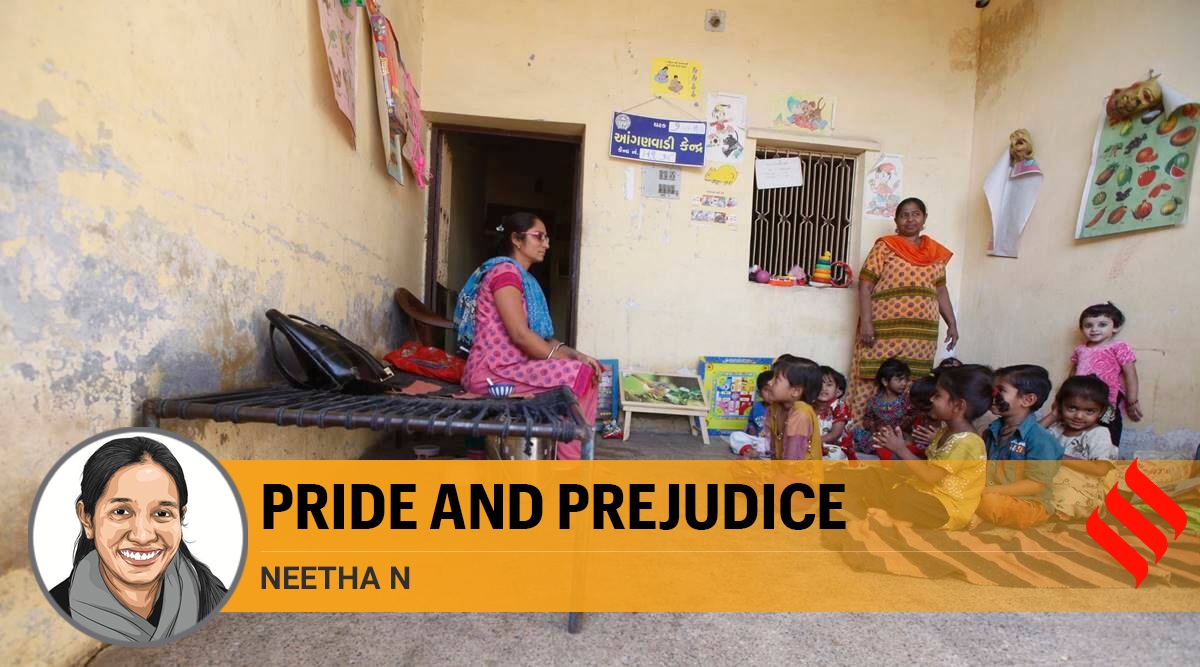 Anganwadi centre in Gujarat. (Express Photo Javed Raja)
Anganwadi centre in Gujarat. (Express Photo Javed Raja) COVID-19 has given visibility to Accredited Social Health Activists (ASHA) and Anganwadi workers — women “volunteers” attached to a government scheme or employed on a mission mode — who are frontline warriors in the battle against the pandemic. In India, there are about a lakh ASHA workers, 1.3 million Anganwadi workers and another 1.2 million Anganwadi helpers, of them women. As the response to the pandemic required localised approaches, services of community workers became useful, given their robust contacts at the grass roots. During the lockdown, when there was uncertainty and fear of the virus, these women became the connecting link between the community and the state machinery.
However, these community worker-volunteers are a perfect example of how the state devalues women’s work, especially the labour of those involved in care work. The stereotype that persists of women’s ability and their inbuilt consciousness to understand other fellow beings’ feelings, especially other women, makes them perfectly suitable to be recruited as community workers. This explains the presence of a large number of women in community-based programmes across the world. But, in India, there is a refusal to recognise this “all women workforce” as workers providing labour. They are classified as “honorary workers”, denied minimum wages, leave and other conditions that work entails. Sugar-coated in the superior value-domain of women as the embodiment of care service providers, the state prefers to call them “volunteers”. The assumption that women’s care and emotional labour is outside the mundane world of markets is often evoked to pay these overworked workers just an honorarium. But, even in the best paid states, this honorarium is not even close to the government-mandated minimum wages offered to workers doing comparable jobs. Many petitions have been submitted by community workers and their unions demanding recognition as workers. During the pandemic, Anganwadi, ASHA and National Health Mission workers had a two-day nationwide strike demanding safety, insurance, risk allowance and fixed wages. The Parliamentary Standing Committee on Labour also recommended formalising the work of community workers. But the government has not relented.
The contributions of these women workers have been taken for granted by the community, an outcome of the social understanding of women’s labour and its invisible status. The one positive aspect of their work is that the society recognises them as a part of the state machinery. This enables many women to negotiate patriarchal restrictions and norms of mobility. However, mobility of women workers is often a contested terrain and gets defined and controlled as per social norms.
Now that the pandemic is moving to the next stage with the coming of the vaccine, these volunteers will be the first to be forgotten both by the state and society at large. From the glorified position of corona warriors, they will slowly retreat to their old unrecognised identity and sphere of neglect.
It is high time that the state recognises the contributions of these women and accept them as workers. This could help in resolving the larger issue of devaluation of women’s work and their secondary status as workers. The exclusionary tendencies of the labour market, rooted in the social understanding of women’s work, where the state is an active participant has not only restricted women’s employment prospects, but has also created silos of women’s employment such as paid domestic work. The declining women’s workforce participation has been a matter of concern even before COVID. Wages and conditions of work of women care workers are matters of concern and the state apathy to recognise the growing sectors of women’s employment such as domestic work has a long history.
With all field reports and CMIE data pointing to a deeper crisis in female employment during the pandemic, state intervention is much needed. The recognition of ASHA and Anganwadi volunteers as workers, even if it is contractual, will thus not only be a tribute to their contribution during the pandemic, but also an opportunity to shake the structural understanding of women’s labour and their status in the labour market. Recognition of care work in the public sphere could also help in unsettling the gendered and unequal division of house work and unpaid care burden.
This article first appeared in the print edition on January 12, 2021, under the title “Pride and prejudice”. The writer is professor, Centre for Women’s Development Studies